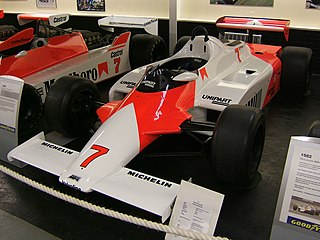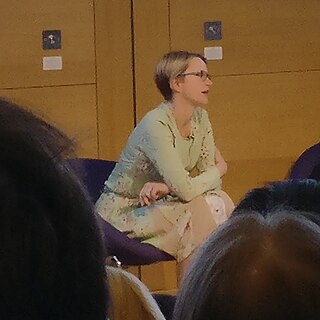
GlaxoSmithKline plc (GSK) is a British multinational pharmaceutical company headquartered in Brentford, London. Established in 2000 by a merger of Glaxo Wellcome and SmithKline Beecham, GSK was the world's seventh largest pharmaceutical company as of 2015, after Johnson & Johnson, Pfizer, Novartis, Merck, Hoffmann-La Roche and Sanofi.

Horlicks is a sweet malted milk hot drink powder developed by founders James and William Horlick. It was first sold as "Horlick's Infant and Invalids Food", soon adding "aged and travelers" to their label. In the early 20th century it was sold as a powdered meal replacement drink mix.

Ronald Dennis CBE is a British businessman and Official British Business Ambassador for The United Kingdom. Dennis is the Global Consultant for Minsheng Investment Corporation and also former owner of Absolute Taste. He is best known for his former role as owner, CEO, chairman and founder of McLaren Technology Group. Dennis was removed from his McLaren management roles in 2016 but remained a director of the company and a 25% shareholder until June 2017, when his 37-year association with the company ended.
The McLaren Group is a British conglomerate based in Woking, Surrey, United Kingdom. Founded by Ron Dennis shortly after his acquisition of the McLaren Formula One team in 1981, it was originally named the TAG McLaren Group due to a partnership with Mansour Ojjeh's TAG Group. It was renamed to simply the McLaren Group in 2003, then to McLaren Technology Group in 2015. The group was originally formed from a Formula One team established by New Zealander Bruce McLaren in 1963 and is now focused around the McLaren F1 Team, the group's second most profitable company.
McLaren Automotive is a British automotive manufacturer based at the McLaren Technology Centre in Woking, Surrey. The main products of the company are supercars, which are produced in-house in designated production facilities. In July 2017, McLaren Automotive became a 100% owned subsidiary of the wider McLaren Group.

The McLaren Technology Centre is the headquarters of the McLaren Group and its subsidiaries, located on a 500,000 m² site in Woking, Surrey, England. The complex consists of two buildings: the original McLaren Technology Centre, which acts as the main headquarters for the group, and the newer McLaren Production Centre, primarily used for manufacturing McLaren Automotive cars.
Goody's Powder, also called Goody's Headache Powders, is an over-the-counter Aspirin/Paracetamol/Caffeine–based pain reliever, in single-dose powder form, which is marketed and sold by Prestige Brands. The powder delivery saves the time needed for the patient's digestive system to break down a tablet or capsule, ostensibly causing the medication to work faster. Goody's Extra Strength Powder consists of aspirin, caffeine, and acetaminophen (paracetamol) in a formula identical to that of Excedrin, a product of Novartis, but in the no-digestion-needed powder form.
A driver development program is a system or structure designed for young kart and race car drivers to learn and perfect their racing skills. These programmes are devised by racing teams, external companies and funded partnerships primarily to attract and develop future racing talent. Most programmes now employ a wide range of skilled coaches and technologies to train all of the physical and psychological abilities inherent in driving at the limit and winning races. Most racing teams will sign a driver to a multi-year contract in which they fund or part fund the driver in junior formulas and gradually help them succeed to the highest levels of motorsport. Some teams have been criticized for unfair long-term and low-paying contracts for the talented drivers they find and whilst also charging the less talented drivers very high fees for the use of their simulations and facilities. Companies that specialise in racing driver training or development programmes remain commercially viable through selling time in their simulators or gyms and generally speaking do not fund a drivers career. Funded partnerships, good driver management companies and driver search and development initiatives will fund or part fund a drivers development and will survive as long as the owners financial commitment and or success at recouping their investment. Be that a return from a talented drivers wages or a promotional exercise designed by a brand or corporation.

The McLaren MP4/1 was a Formula One racing car produced by the McLaren team. It was used during the 1981, 1982 and 1983 seasons. It was the first Formula One car to use a monocoque chassis wholly manufactured from carbon fibre composite, a concept which is now ubiquitous.
Cervarix is a vaccine against certain types of cancer-causing human papillomavirus (HPV).

Sensodyne is a brand name of toothpaste and mouthwash targeted at people with sensitive teeth. Sensodyne products are applied at home. Sensodyne is owned by GlaxoSmithKline and is marketed under the name Shumitect in Japan.

The Beecham Group plc was a British pharmaceutical company. It was once a constituent of the FTSE 100 Index. Beecham, after having merged with SmithKline Beckman to become SmithKline Beecham, merged with Glaxo Wellcome to become GlaxoSmithKline (GSK). GSK still uses the Beechams brand name in the UK for its over-the-counter cold and flu relief products.

The McLaren MP4-12C, later known simply as the McLaren 12C, is a sports car designed and manufactured by McLaren Automotive. It is the first ever production car wholly designed and built by McLaren, and their first production road car produced since the McLaren F1, which ended production in 1998. The car's final design was unveiled in September 2009 and was launched in mid-2011.

The Spark-Renault SRT_01E is an electric formula race car designed for the inaugural season of Formula E, in 2014–15. The car is the result of a 10-month collaboration between Spark Racing Technology, McLaren Electronic Systems, Williams Advanced Engineering, Dallara and Renault. The car was used until the end of Formula E's fourth season in 2018, after which it was replaced by the SRT05e.

Study 329 was a clinical trial conducted in North America from 1994 to 1998 to study the efficacy of paroxetine, an SSRI anti-depressant, in treating 12- to 18-year-olds diagnosed with major depressive disorder. Led by Martin Keller, then professor of psychiatry at Brown University, and funded by the British pharmaceutical company SmithKline Beecham—known since 2000 as GlaxoSmithKline (GSK)—the study compared paroxetine with imipramine, a tricyclic antidepressant, and placebo. SmithKline Beecham had released paroxetine in 1991, marketing it as Paxil in North America and Seroxat in the UK. The drug attracted sales of $11.7 billion in the United States alone from 1997 to 2006, including $2.12 billion in 2002, the year before it lost its patent.

Emma Natasha Walmsley, HonFRSC is the chief executive officer (CEO) of GlaxoSmithKline. She succeeded Sir Andrew Witty, who retired in March 2017. Before working for GSK she worked for L'Oréal for 17 years and was a non-executive director of Diageo until September 2016. She grew up Barrow-in-Furness, Cumbria
Caroline Hargrove is Chief Technical Officer of Babylon Health. She previously served as CTO at McLaren Applied Technologies and a visiting professor at the University of Oxford.

The Spark SRT05E, also known as the Spark Gen2, or simply Gen 2 is an electric formula race car designed for use in the FIA Formula E Championship. The car is the successor to Spark-Renault SRT_01E, and is constructed by Spark Racing Technology with assistance from Dallara, and will be the base car used by all manufacturers and teams from the 2018-2019 FIA Formula E Championship. The car features a new 56 kWh battery from McLaren Applied Technologies, alongside the new Halo cockpit protection system, and is the first Formula E car capable of completing a full-race distance.












